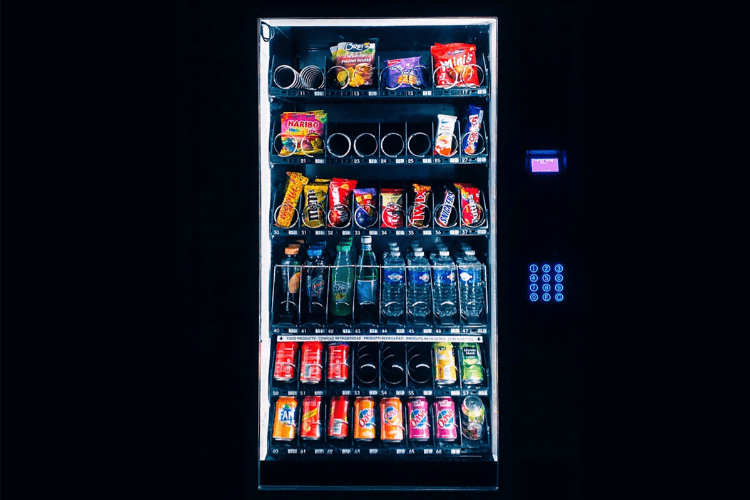How to Start a Vending Machine Business

There are about 4 million vending machines in the U.S. You probably see them just about everywhere: schools, offices, libraries, hospitals, etc. There are even machines that sell medicine and smartphones, in addition to the typical snack and drink machines. But have you ever wondered who owns all these machines and how they profit off them? And maybe, if you’re entrepreneurial, you’ve wondered if you can earn money from owning a vending machine too.
In fact, starting your own vending machine business is relatively cheap and simple. The vending industry is worth $25 million, according to the National Automatic Merchandising Association, and with a little legwork and some spare cash, you can cut a slice of that for yourself. Here’s everything you need to know if you want to start a small vending machine business.
Pros and Cons of Vending Machine Businesses
Before we get into the step-by-step process of starting your business, it’s a good idea to know exactly what you’re getting yourself into. Weighing the benefits and costs is always a good place to start.
Pros
- Passivity: After getting your machine set up, there’s not a ton of work required on your end any longer. All you need to do is keep your machines stocked and functional when necessary and you collect profits. It’s not entirely hands-off, but it’s definitely not as constrained as a typical job.
- Growth Potential: If you start with one machine and find success, it’s easy to build out into a small business as you bring in profits.
- Low Initial Costs: A vending machine can cost around $1,000 to $5,000, but that’s really your only expense. Compared to other business ventures, you won’t have to spend a lot to get started.
Cons
- Competition: As noted earlier, there are already millions of vending machines in the country, which means that most prime locations are already filled.
- Hours: While a vending machine business affords you more flexibility than a standard job, that doesn’t mean you don’t have to put any work in. Be mindful of how many hours you’re willing to commit to make your business profitable, especially early on.
- Other Expenses: Before you scale your business, profits won’t be anything major. When you factor in the other costs around owning a machine, you may not be making much money at all. For instance, machine owners need to pay to rent the space of the machine and cover the costs of electricity, plus owners are taxed extra on certain sugary snacks and drinks.
1. Doing Your Research
Step one for any business venture is market research. Before anything else, familiarize yourself with your industry and your options for getting into it. A few questions that should be at top of mind while you research and plan: what kind of machine do you want, where do you want it, and how do you plan on acquiring it?
Food and beverage vending makes up a majority of the industry and choosing what brands and products to stock is another decision. Depending on where you place your machine, you may want to provide healthier options or exotic brands. Bulk vending is popular as well, and usually includes machines that dispense toys, rubber balls, gumballs, etc. Bulk vending machines usually require less work and lower overhead costs. There’s also specialty vending, which ranges from hot coffee dispensers to smartphone vendors. These machines have the potential for high-profit margins, but are very niche and may attract fewer customers.
The average machine brings in about $300 per month, but no one type naturally does better than another. It all depends on your sales and margins.
Location is also key to a profitable vending machine business. Depending on what you plan to stock your machine with, consider what locations make sense. Ideally, you’ll find a space with solid foot traffic, few other vending machines in the area, and an audience that works with your product. For instance, a machine loaded with candy and soda may not be the best idea for a hospital cafeteria. Weigh all this while you plan your business. You should also research the rates of theft and vandalism in the area you consider as well. A damaged or robbed machine can set you back a long way.
Last but not least, you need to get your hands on a vending machine.
2. Getting Your Machine
There are a few avenues you can go down to buy a vending machine, each of which has its own pros and cons.
- Buying on your own: If you’re willing to put in some extra work, buying and placing a vending machine by yourself can give you added flexibility. You can scour Craigslist and Facebook Marketplace for people selling vending machines – and there’s a surprising amount. You can negotiate the price to save cash, and then work on finding a location. Amazon also has a few vending machines that you can check out.
- Buying an existing machine: Instead of getting, transporting, and placing a machine on your own, you can buy someone out of a machine they already own. Make sure to do your due diligence before buying and figure out why the current owner is selling before committing to anything.
- Buying from a manufacturer: If you can afford to pay extra for the machine itself, you can buy a new model from a distributor or manufacturer. Machines generally cost upwards of $2,000 though, and orders can be subject to fees or high minimum purchase limits.
After you buy a vending machine, the next step is to stock it. Remember to be mindful of the location of your machine when deciding what to put inside.
3. Optimization, Service, and Profits
Once your first machine is set up, you can take a step back and plan out what’s next. Keep an eye on your sales and make changes to your products if you see certain things aren’t selling. Be sure to regularly stock the machine and keep them clean and working. Make sure customers can reach you with any concerns, and keep up a good relationship with the business owner(s) you work with.
After a while, you can expand your business and buy other machines to add extra sources of money. Whether you choose to stick with one vending machine or branch out, these machines are a great way to get experience starting a business and generate some income on the side.
Read More: 5 Small Businesses You Can Start From Home in Your Off-hours









